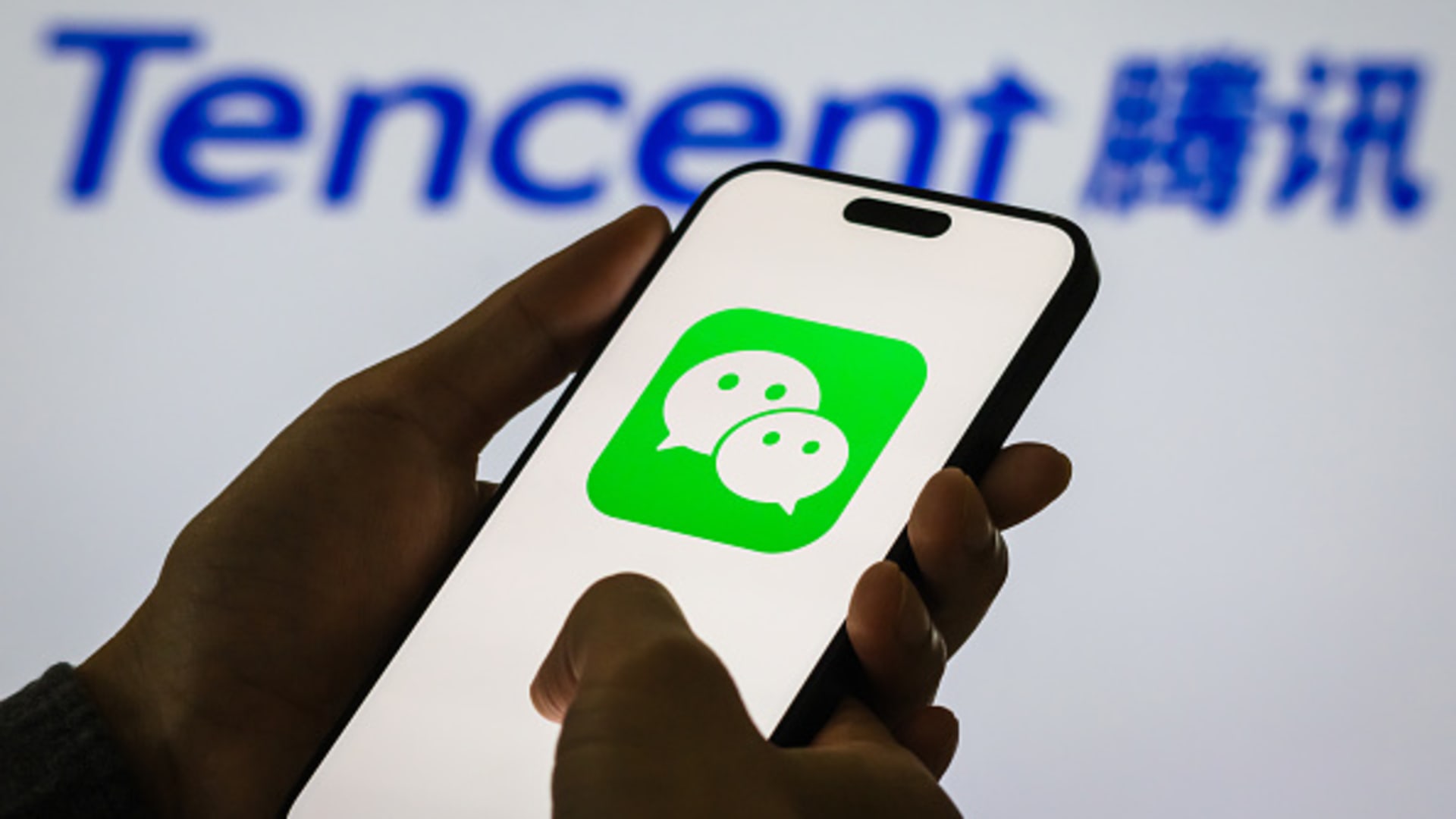Chinese tech company Tencent is a gaming giant and the parent company of WeChat, the ubiquitous social messaging app in China.
Cheng Xin | Getty Images News | Getty Images
SINGAPORE — Chinese tech giant Tencent is increasingly leveraging its WeChat super-app ecosystem to set itself apart from dominant global cloud service players, Tencent Cloud CEO Dowson Tong said.
More clients are interested in engaging in the creation of their own super apps, a service Tencent Cloud offers by way of sharing its technology and operational experience gained as it established the WeChat ecosystem, Tong told CNBC on the sidelines of the recent annual Singapore Fintech Festival.
“That’s something that makes us stand out, compared to many [other] online platforms,” Tong said. Microsoft Azure, Amazon Web Services and Google Cloud Platform are the three largest cloud service providers, making up 68% of the market share as of the second quarter of this year, according to Synergy Research Group.
Super app platforms are often developed using cloud infrastructure to provide scalability, reliability, and efficient resource management.
Tong shared that many of Tencent’s cloud services clients were keen on building their own mini programs on WeChat’s network to attract existing users of the super app to their services.
“Many of our enterprise customers … they want to borrow some of the technologies that make our consumer services successful. They also want to leverage our capability to connect to users,” Tong said.
The financial and government sectors make up the majority of this interest pool, the company shared. For example, Cambodia’s Canadia Bank partnered with Tencent Cloud to launch a new mobile banking app in 2023.
A super app is an application that functions as a one-stop shop for multiple offerings — from messaging to payment transactions to ordering food, among other services. WeChat is the world’s largest super app, boasting around 1.3 billion active monthly users, or around 90% of China’s total population.
While global competitors Amazon, Google and Microsoft offer a range of services to their clients, these are typically spread across several platforms and applications rather than available on an all-encompassing platform like WeChat.
For instance, Amazon specializes in e-commerce, cloud services, and streaming, but does not have a single app integrating these services. Similarly, Microsoft offers enterprise solutions such as Office 365 and gaming, but lacks a comprehensive consumer-facing super app. Google provides search, email, cloud services and Android OS, but each service is accessed individually.
Amazon specializes in e-commerce, cloud services, and streaming i.e Prime Video, but does not have a single app integrating these services together.
Nathan Stirk | Getty Images
In 2022, Microsoft reportedly considered creating a super app, encompassing messaging, web search functions, news and shopping, however, there have been no official statements or follow ups from the company on the report.
That said, while Tencent’s super app ecosystem is a unique one, it may not be the be-all and end-all in the cloud space, said Wei Sun, principal analyst, artificial intelligence team, at Counterpoint Research.
“In the cloud industry, super apps aren’t central to service offerings. Cloud clients prioritize infrastructure reliability, scalability, security, and compliance over integrated consumer-facing applications,” said Sun.
While super apps can enhance user engagement and data collection, these functions do not directly influence the core services sought by cloud clients, she added.
However, Sun acknowledged that there is “definitely massive added-value” for having a super app that can accumulate this pyramid of integrated user data to enhance clients’ data flywheel, where the more data the system collects, the more value can be extracted.
The absence of a super app among the three cloud giants could also be owed to different regulatory concerns and market dynamics in the West, where specialized apps are preferred over all-in-one solutions, she said.
Super apps have gained traction largely in Asia, with Gojek and Grab — besides WeChat — a testament to their gaining popularity.
The global market for super apps was valued at $61.30 billion in 2022 and is projected to expand at a compound annual growth rate of almost 30% between 2023 and 2030, according to a research report, which likely increases the appeal among super app builders for cloud services offered by Tencent.
On top of leveraging its super app expertise, Tong said that Tencent Cloud’s active integration of clients’ public cloud resources with on-premise private resources is also something that helps them become competitive against the international cloud providers, which he said tend to focus on public cloud.
In a public cloud, several customers utilize a shared set of computing resources, such as servers, storage, and networking infrastructure. Having on-premise private resources means that companies can store their own data centers within their own facilities and manage them independently without having to share with other clients.
While Amazon and Microsoft offer hybrid cloud options, Counterpoint’s Sun suggested that what Tencent’s uniqueness might lie in the company’s ability to offer tailored on-premise solutions specific to client needs in the Chinese market, especially customizing it for social media, entertainment, video and gaming optimizations.
“That further gives an edge to its super app WeChat, forming an upward spiral,” she added.


















